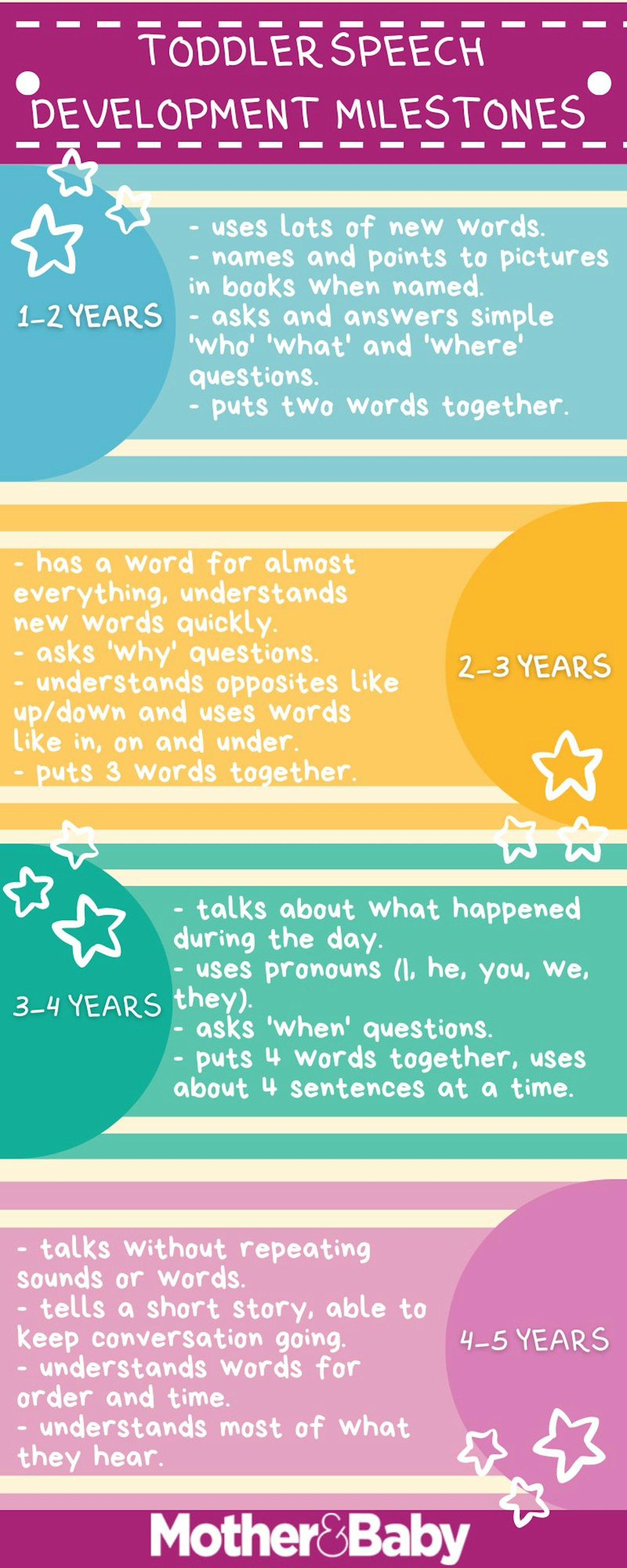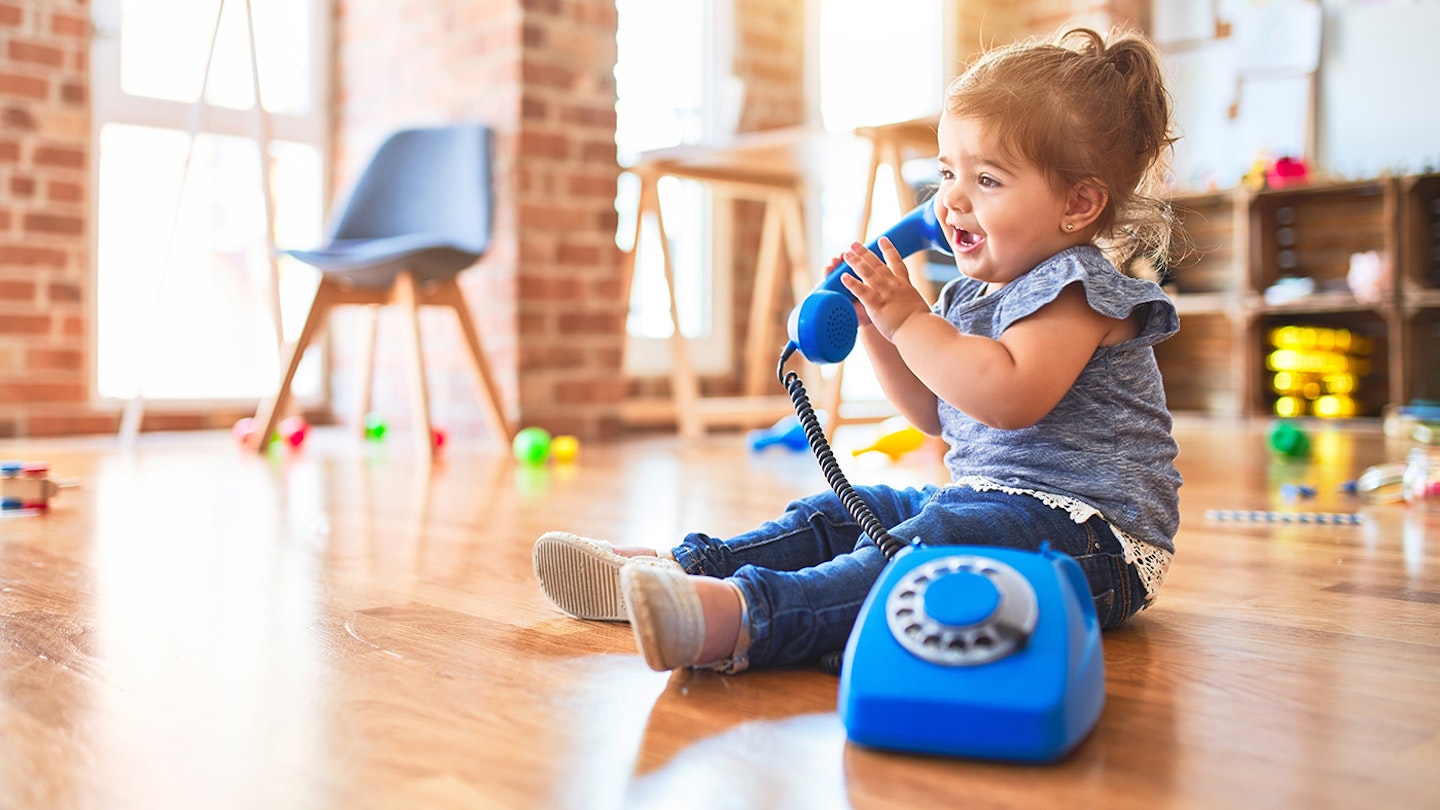It’s exciting to hear your child’s first attempts at stringing sounds together to make a word then later forming their first words and constructing their first sentence. But astoddler speech development progresses, in most cases learninghow to talk isn’t always a straight path.
Even before they can speak little ones are traying to communicate. Janet Cooper Clinical Lead and Speech and Language Therapist at Midland Partnership NHS Foundation Trust tells us: “Pre-verbal skills are important. This is when children and babies learn how to take turns and make sounds – they need to test out these skills and face-to-face interaction is so important for this.”
From birth your little one will be absorbing what you're saying. A few months in you'll start to hear cooing and may see some smiles too. Babies recognise simple words from 6-12 months. They will make raspberries, babbling noises and may say their first word.
At 12-18 months your toddler will understand around 140-190 different words, and be able to say 75-112 words. Sentences will come along at 18-24 months, they'll understand two step directions and more abstract concepts. As they progress their vocabulary will expand, from basic grammar and increasingly complex sentences, to rhyming and figurative language, until they start to combine sentences and take the listener's perspective.
Toddler speech development chart

Common speech problems in toddlers
Seeing or hearing your little one exhibit an unexpected sound can cause us to panic. Royal College of Speech and Language Therapists member Dr Sharon Millard helps us to understand the developmental changes that can all be part and parcel of toddler speech.
Silent treatment
Was your little one a total chatterbox but now clams up? Going quiet can sometimes be a reaction to a new environment while a child becomes secure in their surroundings, or if they feel a bit shy. However, Dr Millard says it is important to get to the root of their silence. She says, ““If your child begins to develop rules about who she or he will and won’t speak to, or speaks freely at home but not outside, then it is important to seek advice from a speech and language therapist.”
Sporadic stammering
It can be alarming for parents if your toddler starts to stammer but there’s a straightforward explanation. According to the Royal College of Speech and Language Therapists approximately 5% of children, and maybe even more than that, will stammer for a period of time.
Sharon adds, “For the majority (almost 80%), the stammer will just go away on its own, but it is very hard to be sure which children will continue to stammer. We know that it is a neurophysiological condition that tends to run in families, which means that some children are born with a more vulnerable speech and language system. It is not caused by anxiety or by anything that parents have or haven’t done.”
It’s not necessary to instantly seek help but Sharon advises us to keep an eye on the child’s communication and go from there: “If a child is bothered by the stammering, it interferes with their ability to communicate, or parents are worried about it, then they should seek support from a speech and language therapist.”
There are a number of helpful websites providing advice for parents:
• Stamma
Lisps in toddlers
While plenty of children exhibit a lisp – when a child has difficulty pronouncing the ‘s’ and ‘z’ sounds – they are generally grown out of in childhood and shouldn’t present a cause for concern. Sharon explains, “Lots of children lisp as they begin to talk and sometimes this will go away on its own. Others may continue to lisp, but it doesn’t interfere with their ability to communicate. For a few, when the lisp persists it reduces the intelligibility of their speech or their confidence to communicate. If that happens, a speech and language therapist may be able to provide some guidance.”
Screaming
If your child chooses to communicate via screaming, it’s important to find out why and you should seek professional advice. As Sharon tells us, “If a child keeps screaming, there may be any number of reasons and you should contact your GP and or Health Visitor in the first instance to rule out any pain or illness.”
Can screen time affect toddler speech development?
It might seem extreme but would banning screens in your home be helpful as your child learns to speak? Janet tells us to be more relaxed: “It’s about balance and being realistic. We have so many screens in our lives with phones, television and tablets. It is important to have time to connect with each other, too. Babies are born hardwired to communicate, their neural pathways are there but 90% of the brain’s growth happens in the first year. Try turning off music and TV and use this time to play a game together or share a book.”
Don’t add pressure
While you might be keen to get more from your child verbally, it’s important to go at his or her pace. There are strategies you can employ to encourage them to speak, as Dr Millard explains:
“It can be tempting to try to ‘force’ a child to communicate and find ways to make them speak. When talking with your child use comments rather than questions, leave lots of gaps so that your child can engage when they are ready and focus on participation which can include non-verbal communication. Try to avoid building up expectations to speak and discomfort for the child.”
How do I access a speech and language therapist?
While you might automatically think your health visitor or GP can advise on a referral to speech and language therapists, or perhaps your child’s nursery will give a recommendation, this process varies from practice to practice. You can get more information from The Royal College of speech and language therapists.
